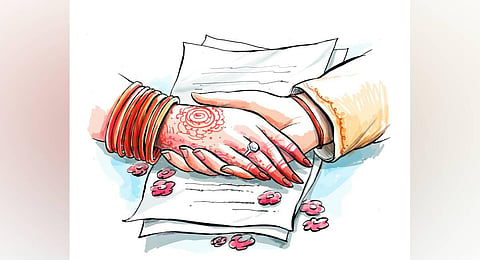

NEW DELHI: No experience can be more harrowing for a husband than to see his wife act as a widow while he is alive, and such conduct amounts to 'extreme cruelty', the Delhi High Court has said.
It said a marriage cannot survive if a spouse deprives the other of a conjugal relationship and doing so is also an act of cruelty.
"Nothing can be a more harrowing experience for a husband than to see his wife act as a widow during his lifetime, that too in a situation where he was seriously injured and expected nothing more than care and compassion from his significant other half. Undeniably, such conduct of the appellant/ wife can only be termed as an act of extreme cruelty towards the respondent/ husband," a bench of Justices Suresh Kumar Kait and Neena Bansal Krishna said.
The high court's judgment came while dismissing a woman's appeal challenging a family court's decision granting a divorce decree in her husband's favour, holding that she acted with cruelty towards him.
"We thus, conclude that the evidence on record proved that there is no chance of reconciliation between the parties and such long separation peppered which false allegations, police reports and criminal trial can only be termed as mental cruelty."
"The marital discord between the parties has pinnacled to complete loss of faith, trust, understanding, love and affection between the parties. This dead relationship has become infested with acrimony, irreconcilable differences and protracted litigations; any insistence to continue this relationship would only be perpetuating further cruelty upon both the parties," the bench said.
It said the bedrock of any matrimonial relationship is cohabitation and conjugal relationship. The couple got married in April 2009 and a daughter was born to them in October 2011.
The woman had left her matrimonial home a few days before she delivered the child.
The man filed a divorce petition in the family court claiming since the beginning of their married life his wife was indifferent to him and had no interest in discharging her matrimonial obligations.
He alleged after she refused to do household chores, the man's father was compelled to take care of routine tasks like cooking meals.
The woman denied the allegations levelled by the man and claimed it was her husband who had encouraged her to go to her parental home from where she returned after 2-3 days.
She also rejected the allegation that she stayed away from the matrimonial home for 147 days.
The man claimed his wife used to get annoyed on petty issues and would quarrel with his family, and once she refused to keep fast on Karwachauth' as the husband had not got her mobile phone recharged.
Married Hindu women fast for their husband's long life and well-being during the festival.
Referring to another incident, the man said in April 2011, when he had a slipped disc, his wife, instead of taking care of him, removed the vermillion mark from her forehead, broke her bangles and wore a white suit, declaring that she has become a widow.
The high court termed it an ultimate act of rejection of matrimonial relationship, reflecting her intention of repudiation of the matrimonial relationship.
The bench clarified that fasting or not fasting on 'Karwachauth' may be an individual choice and, if dispassionately considered, may not be termed as an act of cruelty.
It said having different religious beliefs and not performing certain religious duties would not amount to cruelty and not be sufficient to sever a marital tie.
"However, when coupled with the conduct of the wife and in the circumstances as proved by the husband in the present case, it is established that non-conforming with the prevalent rituals in Hindu culture, which symbolises love and respect for the husband as well as the matrimonial relationship, fortifies the irresistible conclusion that the wife had no respect for the husband and their marital bond," it said.
The court said it also reflected that the wife had no intention to continue the marriage.